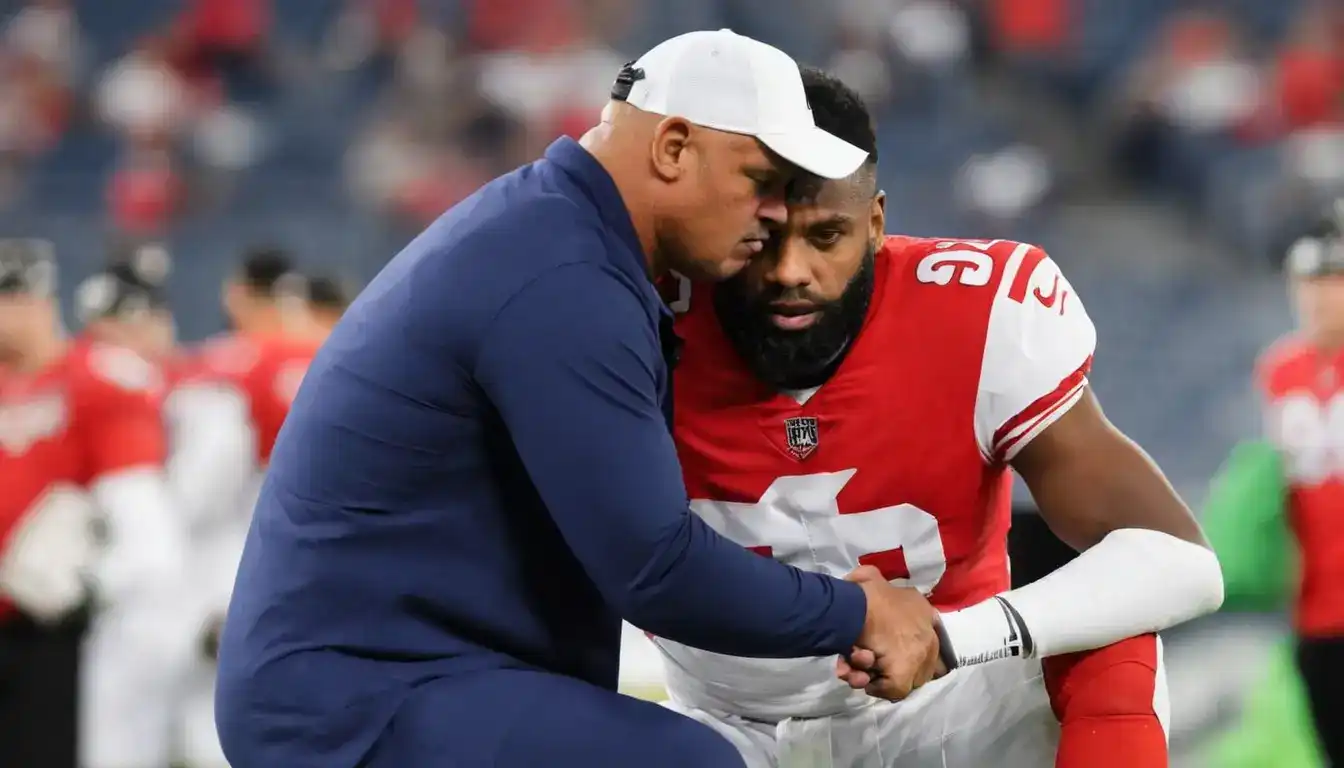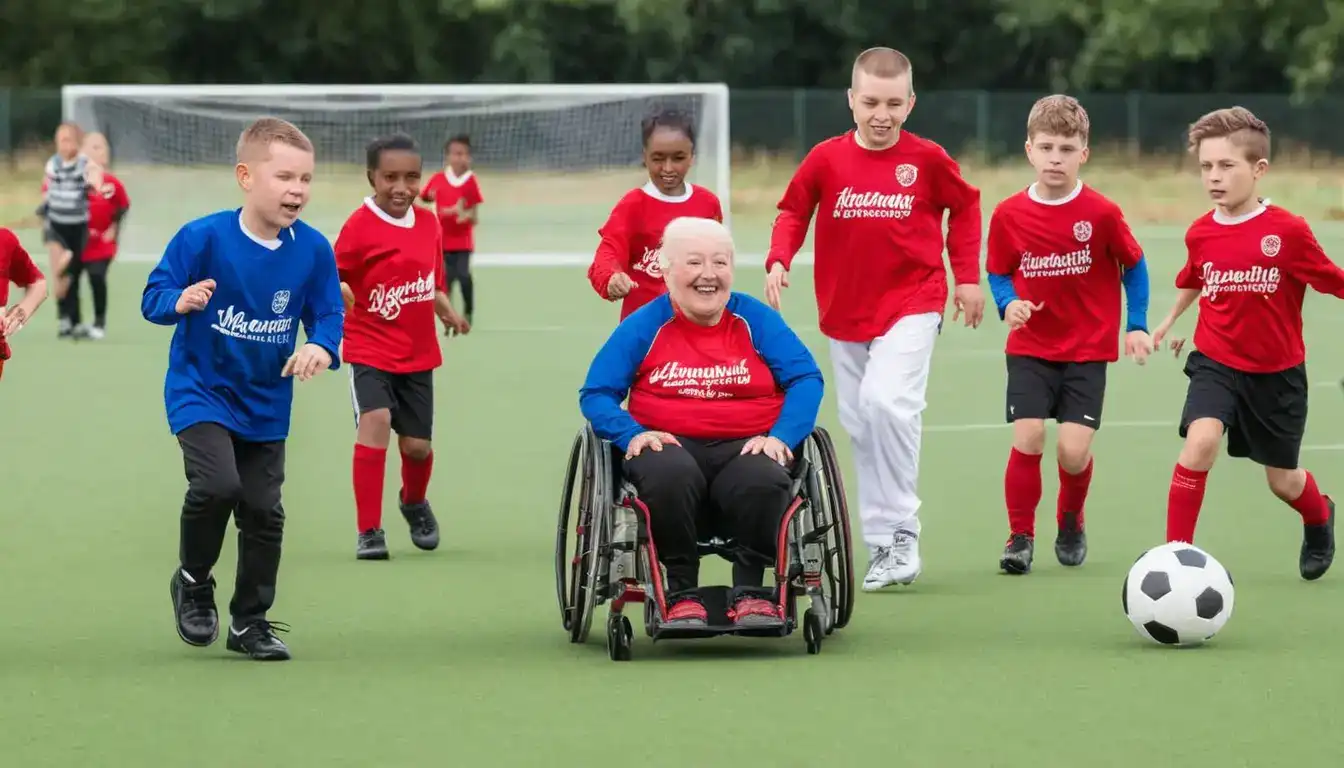Mental Health Matters in Sports: Athletes Face Unique Challenges
Emily Willis

Photo: Mental Health Matters in Sports: Athletes Face Unique Challenges
For many, athletes are the embodiment of peak physical fitness and mental strength. They push their bodies to the limit, defying expectations and achieving athletic glory. However, the reality is far more nuanced. Behind the medals and trophies lies a complex world where athletes face a multitude of mental health challenges.
The Pressure to Perform: A Constant Battle
Athletes often operate under immense pressure. The expectations of coaches, fans, and sponsors can be overwhelming. Constant pressure to win, coupled with the fear of failure, can take a significant toll on mental well-being. This can manifest in various ways, including:
- Anxiety: The fear of performing poorly or getting injured can lead to performance anxiety, hindering performance and creating a vicious cycle.
- Depression: Chronic disappointment, setbacks, and the feeling of not being good enough can contribute to feelings of worthlessness and depression.
- Eating Disorders: Pressure to maintain a certain physique, coupled with the control athletes may feel over their bodies, can lead to the development of eating disorders like anorexia or bulimia.
- Substance Abuse: Some athletes may resort to using drugs or alcohol as a coping mechanism to deal with the stress and pressure of competition.
- Burnout: The relentless pursuit of excellence can lead to burnout, characterized by exhaustion, cynicism, and a sense of reduced accomplishment.
Unique Challenges for Different Sports
While the pressure to perform is universal, the specific challenges athletes face can vary depending on the sport:
- Individual vs Team Sports: Individual athletes may grapple with isolation and self-doubt, whereas team sports can bring pressure to conform and fear of letting teammates down.
- High-Risk Sports: Athletes in high-risk sports like extreme sports or motorsports may face additional fears of injury or death.
- Aesthetic Sports: Sports with a high emphasis on appearance, like gymnastics or figure skating, can exacerbate body image issues and eating disorders.
Transitioning Out of Sports: A Vulnerable Time
The end of an athletic career can be a difficult transition. Athletes may experience feelings of loss, identity crisis, and a sense of emptiness. This period requires strong emotional support and a focus on developing new skills and passions outside of sports.
Promoting Mental Well-being for Athletes
The good news is that mental health awareness in sports is growing. Here's how we can foster a culture of well-being for athletes:
- Destigmatizing Mental Health: Openly discussing mental health challenges helps athletes understand they're not alone and encourages them to seek help.
- Providing Resources: Teams and leagues should provide access to qualified mental health professionals who specialize in working with athletes.
- Building Resilience: Sports psychology training can equip athletes with coping mechanisms to deal with pressure and setbacks.
- Promoting Healthy Habits: Regular exercise, healthy eating, and healthy sleep patterns are crucial for maintaining good mental and physical health.
- Developing Life Skills: Education on career planning and personal development skills can help athletes prepare for life beyond sports.
Athletes as Role Models for Mental Health
Athletes can play a powerful role in promoting mental health awareness. By openly discussing their own struggles and seeking help, they can inspire others to do the same. Here are some examples of athletes who have spoken out about mental health:
- Michael Phelps: The most decorated Olympian of all time has spoken openly about his battles with depression and anxiety.
- Simone Biles: The champion gymnast prioritized her mental health by withdrawing from certain events at the 2020 Tokyo Olympics.
- Kevin Love: The NBA star has been vocal about his struggles with anxiety and has become an advocate for mental health awareness.
Conclusion: Championing Mental Wellness in Sports
Mental health is just as important as physical health for athletes. By acknowledging the unique challenges they face, providing support systems, and promoting mental well-being, we can create a healthier and more sustainable environment for athletes to thrive. When athletes prioritize their mental health, we can all benefit from their resilience, dedication, and the inspiration they bring to the world.
Additionally, here are some ideas to consider:
- Highlight resources for athletes struggling with mental health challenges.
- Explore the role of social media in exacerbating mental health issues for athletes.
- Discuss ways to identify athletes at risk for mental health problems.
By fostering a conversation around these topics, we can ensure that mental health matters not just in sports, but in life as a whole.
Latest ✨
View Alloverview of Search Engine Optimization (SEO) and outlines essential strategies for optimizing a website and content to attract more organic traffic. It covers fundamental concepts of SEO, keyword research, creating high-quality content, on-page and off-page SEO, technical SEO, measuring and analyzing SEO performance, and additional tips for sustainable SEO success.
Emily Willis
invitation to go on a wildlife safari through Kenya, Tanzania, and Australia. It describes the unique wildlife encounters in each country, such as witnessing the Great Migration in Kenya, exploring the Serengeti in Tanzania, and encountering koalas and kangaroos in Australia.
Emily Willis
importance of inclusion in sports, highlighting the benefits it brings such as improved health, social connection, breaking down barriers, and building confidence.
Emily Willis
importance of building confidence in children to help them succeed in their learning journey. It discusses the benefits of confidence, common challenges that can hinder it, and practical strategies to nurture it.
Emily Willis
Business
View All
August 5, 2024
Inspiring Leaders Who Can Be Your Role Modelseffective leadership in a constantly changing world and explores the traits and habits of inspiring leaders, both historical and contemporary. It highlights the key lessons from leaders such as Nelson Mandela, Martin Luther King Jr., Jacinda Ardern, Elon Musk, and Malala Yousafzai.
Emily Willis

August 4, 2024
Tips to Increase Work Productivity in BusinessIncreasing work productivity in business is achievable with the right strategies and mindset. By setting clear goals, prioritizing tasks, eliminating distractions, taking breaks, delegating responsibilities, using technology, maintaining a healthy work-life balance, continuously improving skills, fostering a positive work environment, and monitoring progress, you can boost productivity and achieve better results.
Emily Willis

August 5, 2024
Tips for Creating a Positive and Productive Work CultureCreating a positive and productive work culture is essential for the success of any organization. It requires continuous effort and dedication. The importance of work culture is highlighted, and tips for creating a positive work culture are provided, including planning social outings, maintaining clear expectations, creating listening posts, building psychological safety, watching trends, leading by example, fostering open communication, recognizing and rewarding employees, emphasizing work-life balance, celebrating milestones, providing opportunities for growth and development, and conducting regular feedback sessions.
Emily Willis
Economy
View AllClimate change is no longer a future threat, but a present reality with significant economic consequences. Extreme weather events, rising sea levels, and health impacts are already impacting individuals, businesses, and economies. The cost of inaction on climate change far outweighs the cost of taking action, as it leads to increased disaster relief costs, loss of natural resources, erosion of property values, and social unrest.
Read MoreSenior secured financing explained: benefits, types, tips, and real-world examples to help businesses access low-risk, asset-backed capital solutions.
Read MoreDiscover the hidden connections that drive global stock markets. Explore stock correlations, their impact on diversification and risk, and how to calculate them. Learn how to apply this knowledge to your investment strategy and uncover secrets to making more informed decisions.
Read MoreEntertainment
View All
August 4, 2024
The Latest Music Trends, Artists Influencing Pop Culture, and How Digital Platforms Facilitate the Distribution of Music GloballyThe music industry is constantly changing due to consumer preferences, technology, and the influence of artists. Digital platforms have revolutionized music creation, distribution, and consumption, leading to genre fusion, the rise of independent artists, and collaborative projects. Influential artists like Billie Eilish, BTS, and Taylor Swift have shaped pop culture globally. Streaming services, social media, and direct-to-fan engagement have transformed music distribution. Digital platforms also promote cultural diversity and inclusivity, expand markets and revenue, and drive technological advancements. The industry is also focusing on sustainability and ethical practices. To succeed in the future, stakeholders must embrace digital transformation and champion inclusivity.
Emily Willis

August 4, 2024
Exploring Virtual Reality (VR) in Entertainment: Future Applications and DevelopmentsVirtual Reality (VR) technology is revolutionizing the entertainment industry by providing immersive and interactive experiences that transform audience interaction with content. VR creates simulated environments that allow users to engage with virtual worlds, characters, and narratives in ways that traditional media cannot.
Emily Willis

August 5, 2024
Entertainment in Society: Social Impact, Cultural Influence, Economic ContributionsEntertainment is more than just a way to pass the time it has a significant impact on society, culture, and the economy. It promotes empathy, sparks conversations, and drives social change. It reflects and shapes cultural trends, while also preserving traditions. The entertainment industry generates jobs, contributes to economic growth, and drives technological innovation.
Emily Willis
Health
View AllA healthy lifestyle is crucial for enhancing overall quality of life in today's fast-paced world. It involves habits such as a nutritious diet, regular exercise, adequate sleep, stress management, and avoiding harmful substances. Benefits include improved physical health, enhanced mental well-being, increased energy levels, better sleep quality, and longevity. Implementing healthy habits gradually, staying consistent, seeking support, and monitoring progress are key steps towards a healthier lifestyle. Prioritizing a healthy lifestyle is not just about adding years to life but about adding life to years, leading to a more fulfilling and vibrant life.
Emily Willis
Regular exercise is essential for maintaining both physical and mental health. It helps with weight management, cardiovascular health, muscle strength, energy levels, and sleep quality. Exercise also reduces stress and anxiety, improves mood, cognitive function, and self-esteem, and lowers the risk of depression. Different types of exercises, such as aerobic, strength training, flexibility, balance, and mind-body exercises, contribute to overall health. To start and maintain an exercise routine, it is important to start slowly, set realistic goals, find enjoyable activities, stay consistent, and listen to your body.
Emily Willis
preventive health measures in promoting longevity and enhancing quality of life. It discusses essential strategies such as maintaining a balanced diet, regular physical activity, adequate sleep, stress management, regular health screenings, immunizations, avoiding harmful substances, and prioritizing mental health.
Emily Willis
Trending 🔥
View All
2
3
4
6
7
8
9
10
Sports
View AllAugust 5, 2024
The Future of Sports: Anticipating Trends, Embracing Innovation, Shaping a New Era
Read MoreTechnology
View All
August 5, 2024
The Impact of AI on the Future of Work and Education
AI is rapidly advancing and reshaping industries, economies, and societies, especially in the areas of employment and education. In the workplace, AI is changing roles through automation and creating new job opportunities. The future of work will most likely involve collaboration between humans and AI, requiring workers to develop new skills and engage in lifelong learning.

August 5, 2024
How AI is Used to Solve Problems in Various Industries
Artificial Intelligence (AI) is reshaping industries across the globe, from healthcare to finance, by solving complex problems, increasing efficiency, and driving innovation. In healthcare, AI is saving lives through drug discovery, disease diagnosis, personalized medicine, and virtual health assistants.

August 5, 2024
Tips for Implementing Cloud Computing Safely and Efficiently
Cloud computing is essential for modern businesses, offering cost savings, scalability, and improved collaboration. Implementing cloud computing requires careful planning to ensure safety and efficiency. Tips for safe and efficient implementation include conducting a needs assessment, choosing the right cloud service model, prioritizing security, planning for data migration, optimizing costs, training your team, implementing backup and recovery solutions, monitoring performance, planning for scalability, and staying updated with industry trends.

August 5, 2024
AI Applications that are Changing the World Around Us
Artificial Intelligence (AI) is no longer a concept from science fiction, but a reality that is reshaping the world around us. From virtual assistants to self-driving cars, AI is making significant impacts in various industries such as healthcare, education, transportation, and agriculture. AI is also being used to address environmental challenges and enhance customer experiences.





















